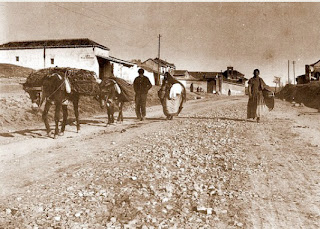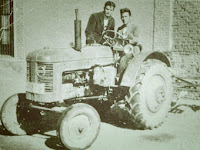In Marjaliza, mother Inmaculada was hired by the widow of Juan Aragonés, Mrs. Felisa Serrano, the main olive grower in the town with more than 600 hectares of olive grows and a well established agro venture.
 Marjaliza is a small village at the foothills of the Mountains of Toledo. The weather is very cold in the winter and warm in the summers. This combination is naturally the best that olive and almond trees can find, and it is not rare to contemplate the beautiful olive groves covered by snow during weeks around December/January.
Marjaliza is a small village at the foothills of the Mountains of Toledo. The weather is very cold in the winter and warm in the summers. This combination is naturally the best that olive and almond trees can find, and it is not rare to contemplate the beautiful olive groves covered by snow during weeks around December/January.
At the Marjaliza large state, the Aragonés family had landscaped an impressive grove over many years, with thousand of trees of age, mainly the Cornicabra variety, the local varietal tree whose name first appeared during XVIII century. Cornicabra is today's second largest grown variety in Spain and it is well known out of its lesser oxidative properties, its character & suitability for long lasting conditions of shelf life.
At that time, it was rare to find mechanical systems working in the olive groves in the large part of Castile-La Mancha territory, ; it was in these lands of the Aragonés family where modern tractors were introduced and the need for management and maintenance arose.
This modernization of agriculture at Marjaliza state soon found young Anastasio employed in maintenance work related to tractors, transportation trucks and other mechanical devices, even electrical machinery and systems. It started to remain clear for the employer and for the rest of the employees that Anastasio Sambrini had more inclination towards these tasks than for other types of labour at the fields, as he was keeping himself very busy amongst screw nuts and bolts, gaining knowledgeable experience rather quickly.
As the landowner's daughter lady Ms. Pilar Aragonés married a young man from nearing town of Los Yébenes, Juan Rubio Navarro, belonging to a family with businesses in the wheat and olive oil manufacturing, Anastasio started working at the newly established olive crushing mill of Los Yébenes, where he set as its mill master during the crushing season while employed at the Aragones agro state the rest of the year. He was right at the birth of one of the most important olive oil ventures of Spain for years to come.
Los Yébenes' town is at 5 km distance of Marjaliza. It's name derives from the arab "Yeblalzar", meaning the "hill of the presses", the olive oil mills first established there around the 8th century following the tradition set by the Romans in the same region. The Rubio family had started olive crushing industrial operations in the decade of 1940, working with olives obtained in their lands as well as olives received from other landowners of the region such as the Aragonés.
 Marjaliza is a small village at the foothills of the Mountains of Toledo. The weather is very cold in the winter and warm in the summers. This combination is naturally the best that olive and almond trees can find, and it is not rare to contemplate the beautiful olive groves covered by snow during weeks around December/January.
Marjaliza is a small village at the foothills of the Mountains of Toledo. The weather is very cold in the winter and warm in the summers. This combination is naturally the best that olive and almond trees can find, and it is not rare to contemplate the beautiful olive groves covered by snow during weeks around December/January.At the Marjaliza large state, the Aragonés family had landscaped an impressive grove over many years, with thousand of trees of age, mainly the Cornicabra variety, the local varietal tree whose name first appeared during XVIII century. Cornicabra is today's second largest grown variety in Spain and it is well known out of its lesser oxidative properties, its character & suitability for long lasting conditions of shelf life.
At that time, it was rare to find mechanical systems working in the olive groves in the large part of Castile-La Mancha territory, ; it was in these lands of the Aragonés family where modern tractors were introduced and the need for management and maintenance arose.
This modernization of agriculture at Marjaliza state soon found young Anastasio employed in maintenance work related to tractors, transportation trucks and other mechanical devices, even electrical machinery and systems. It started to remain clear for the employer and for the rest of the employees that Anastasio Sambrini had more inclination towards these tasks than for other types of labour at the fields, as he was keeping himself very busy amongst screw nuts and bolts, gaining knowledgeable experience rather quickly.
As the landowner's daughter lady Ms. Pilar Aragonés married a young man from nearing town of Los Yébenes, Juan Rubio Navarro, belonging to a family with businesses in the wheat and olive oil manufacturing, Anastasio started working at the newly established olive crushing mill of Los Yébenes, where he set as its mill master during the crushing season while employed at the Aragones agro state the rest of the year. He was right at the birth of one of the most important olive oil ventures of Spain for years to come.





No hay comentarios:
Publicar un comentario